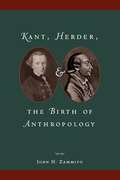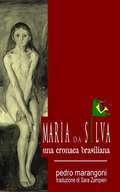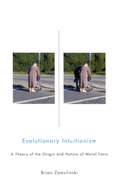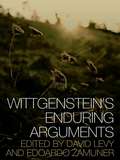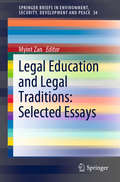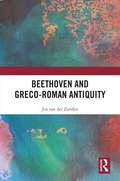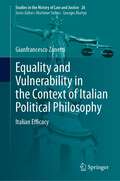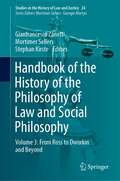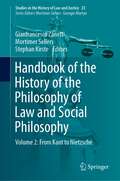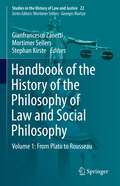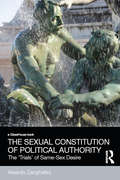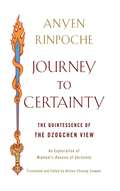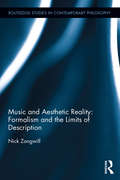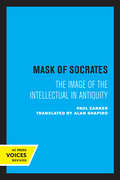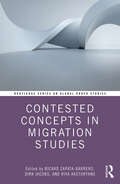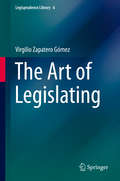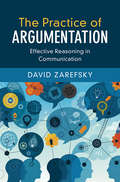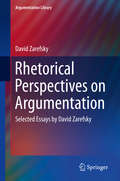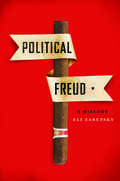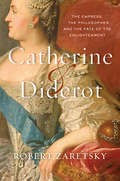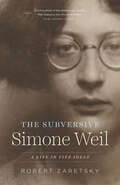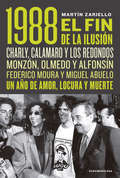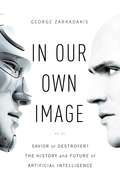- Table View
- List View
Kant, Herder, and the Birth of Anthropology
by John H. ZammitoIf Kant had never made the "critical turn" of 1773, would he be worth more than a paragraph in the history of philosophy? Most scholars think not. But in this pioneering book, John H. Zammito challenges that view by revealing a precritical Kant who was immensely more influential than the one philosophers think they know. Zammito also reveals Kant's former student and latter-day rival, Johann Herder, to be a much more philosophically interesting thinker than is usually assumed and, in many important respects, historically as influential as Kant. Relying on previously unexamined sources, Zammito traces Kant's friendship with Herder as well as the personal tensions that destroyed their relationship. From this he shows how two very different philosophers emerged from the same beginnings and how, because of Herder's reformulation of Kant, anthropology was born out of philosophy. Shedding light on an overlooked period of philosophical development, this book is a major contribution to the history of philosophy and the social sciences, and especially to the history of anthropology.
Maria da Silva - Una cronaca brasiliana
by Sara Zampieri Pedro MarangoniNon si può affermare che Maria da Silva sia un lavoro di finzione, perché è una cronaca del quotidiano senza ritocchi. Un piccolo libro sulla vita breve di una rivenditrice di spazzatura. Qui non ci sono descrizioni superflue, così l'immaginazione del lettore, mentre legge il romanzo, comporrà l'ambiente con lo scenario che conosce, che si svolge vicino a lui, che visualizza giorno per giorno e le cui dinamiche gli sono ignote. Le "Maria da Silva" muoiono quotidianamente di inedia e di malattie non curate, in un breve e tragico cammino di vita, portando con sé un'intera storia ignorata dai più. È ora di vederle come esseri umani, e questo piccolo libro può aiutare. Sento che l'opera non è mia, io sono solo un tramite del messaggio di Maria da Silva. Credo che se qualche lettore cambierà dopo averla conosciuta, che sia solo nello sguardo che lancia ai senzatetto che rivendono spazzatura -che estraggono quello che viene disprezzato, senza elemosinarlo- la missione che mi è stata assegnata dal caso sarà compiuta.
Evolutionary Intuitionism
by Brian ZamulinskiEvolutionary Intuitionism presents a new evolutionary theory of human morality. Zamulinski explains the evolution of foundational attitudes, whose relationships to acts constitute moral facts. With foundational attitudes and the resulting moral facts in place, he shows how they ground a plausible normative morality, give answers to meta-ethical questions, and provide an account of moral motivation. He explains the nature of moral intuitions and, thus, of our access to the moral facts. He shows that the theory makes confirmed empirical predictions, including the observable variation in moral views. The combination of intuitionism and evolutionary ethics enables Zamulinski to overcome the standard objections to both.
Evolutionary Intuitionism: A Theory of the Origin and Nature of Moral Facts
by Brian ZamulinskiEvolutionary Intuitionism presents a new evolutionary theory of human morality. Zamulinski explains the evolution of foundational attitudes, whose relationships to acts constitute moral facts. With foundational attitudes and the resulting moral facts in place, he shows how they ground a plausible normative morality, give answers to meta-ethical questions, and provide an account of moral motivation. He explains the nature of moral intuitions and, thus, of our access to the moral facts. He shows that the theory makes confirmed empirical predictions, including the observable variation in moral views. The combination of intuitionism and evolutionary ethics enables Zamulinski to overcome the standard objections to both.
Wittgenstein's Enduring Arguments
by Edoardo Zamuner D. K. LevyFifty years after Wittgenstein's death, his philosophy and the arguments it embodied remain vital and applicable. Wittgenstein's Enduring Arguments illustrates the use of Wittgenstein's thought for continuing philosophical debates, old and new. Featuring essays by leading international philosophers, the collection examines the key theme of representation in Wittgenstein's philosophy. Organised into three clear parts the book considers representation in cognition, in language and in what cannot be represented - the absolute. The first part applies Wittgenstein to leading questions concerning qualia, the grammar of phenomenology and developmental psychology. The second part applies Wittgenstein to vexing knots in the philosophy of language like language and concept acquisition, the normativity of meaning and linguistic understanding. The final section addresses Wittgenstein's unique philosophical approach to logic, self, religion and ethics. Each specially commissioned chapter demonstrates the successful application of Wittgenstein's philosophy; collectively they express a confidence that Wittgenstein's arguments and his philosophy will endure. Wittgenstein's Enduring Arguments is essential reading for those seeking to examine and assess the philosopher's lasting contribution to modern thought.
Legal Education and Legal Traditions: Selected Essays (SpringerBriefs in Environment, Security, Development and Peace #34)
by Myint ZanThis book deals with aspects of legal education and legal traditions. Part I includes chapters on teaching Law of the Sea, legal ethics and educating lawyers as ‘transaction cost engineers’ as well as comparison of teaching law in a refugee camp and in a Malaysian University. Part II on legal and philosophical traditions includes essays on what later philosophers would have commented on Plato’s arguments in the Crito regarding ‘absolute obligation to obey the law’ and what Socrates would have said on two conversations in the 19th century novel Uncle Tom’s Cabin regarding the morality and legality of harbouring runaway slaves. Part II concludes with two essays regarding the applicability of the Hart-Devlin debate on the ‘enforcement of morals’ vis-à-vis the International Criminal Court and an essay on what the historian Arnold Toynbee would have commented on the ‘contingency’ v ‘teleology’ debate between two palaeontologists the late Stephen Jay Gould and Simon Conway Morris.• Legal education of interest to legal educators and students • Legal, political, moral philosophy as well as philosophy of history of interest to law, philosophy and history teachers, postgraduate and under graduate students• Aspects of legal ethics for law teachers, students and legal professionals• Interdisciplinary studies regarding law and economics, law and literature, law and social justice for law, humanities, social science academics and students.
Beethoven and Greco-Roman Antiquity
by Jos van ZandenLudwig van Beethoven had a life beyond music. He considered it his duty to spend leisure-time improving his Bildung (sophistication). To this end he familiarised himself with tangible manifestations of Greco-Roman antiquity, for he perceived these cultures and their representatives as examples of intellectual, moral, and artistic perfection. He consumed such writers as Homer, Plutarch, Horace, Tacitus, Euripides, and Greek poets. These texts were morally uplifting for him, and advantageous for building character. They now hold a key to Beethoven’s ideal of a steadfast, austere, and Stoic outlook, necessary for a ‘great man’ to carry out his duties. Jos van der Zanden demonstrates that Beethoven’s engagement with Greco-Roman culture was deep and ongoing, and that it ventured beyond the non-committal. Drawing on a comprehensive investigation of primary sources (letters, conversation books, diaries, recollections of contemporaries) he examines what Beethoven knew of such topics like history, art, politics, and philosophy of antiquity. The book presents new information on the composer’s republicanism, his familiarity with the works of Plato, his admiration of the elderly Brutus, his plan to utilize ‘unresolved dissonances’ in an unknown piece of music, and his decision to subscribe to a book about ancient Greek poetry. A hitherto unknown vocal piece based on lines by Euripides is revealed. The study concludes with a comprehensive survey of all compositions and sketches by Beethoven based on Greco-Roman subjects.
Equality and Vulnerability in the Context of Italian Political Philosophy: Italian Efficacy (Studies in the History of Law and Justice #26)
by Gianfrancesco ZanettiOne of the main goals of this book is to determine if, in the works of some of the key authors in the history of Italian political philosophy, a notion of “efficacy” can be found. In legal philosophy, “efficacy” is the capacity a norm has to effectively influence citizens’ behavior. The “principle of efficacy” is that according to which an order or rule exists as such when it is followed effectively in practice. Here by “efficacy” I mean the idea that normative phenomena are self-justifying, without reference to extrinsic systems of value (such as “natural law”). The examinations of several texts undertaken here constitute reflections on this theme, without any claim to systematicity. They have been grouped together, roughly in historical order, by their common respect for the contexts within which they reason and reach decisions, which lends them a characteristic flavor of harsh realism that at times relies on a minimalist use of traditional normative categories.The second theme that emerges through the respective chapters (each of which constitutes the text for a lesson in a course for Ph.D. students) is that of the relationship between “equality” and “vulnerability.” Here the idea is to elaborate a concept of “vulnerability” that is not underpinned by what we in Italy call an “anthropology,” that is, a fixed notion of human nature. Instead this concept should be comprehensible and graspable solely on the basis of the recognition of decisions and actions that are merely “efficacious,” that function “for what they are, and what they do.” This recognition doesn’t even need to be explicitly articulated by these authors with any specific, deliberately conscious awareness.The goal is not to identify a precise tradition of thought, one which elaborates a given line of reflection, but rather to highlight certain “themes” that emerge in the texts examined, even as the authors write with and for their own specific, contingent set of motives, which differ from time to time and place to place. These authors include some who are widely known, such as Dante, Machiavelli, and Beccaria. At times they are figures who typify certain key historical episodes, such as the Risorgimento (Giuseppe Mazzini) or Fascism (Cesare Lombroso and Santi Romano), while others reflect certain aspects of a contemporary debate (Pasolini and the “Braibanti affair”).The book is based on lectures given for a 2021 Ph.D. Course at the University of California, Berkeley’s Department of Italian Studies.
Handbook of the History of the Philosophy of Law and Social Philosophy: Volume 3: From Ross to Dworkin and Beyond (Studies in the History of Law and Justice #24)
by Gianfrancesco Zanetti Mortimer Sellers Stephan KirsteThis Handbook discusses representative philosophers in the history of the philosophy of law and social philosophy, giving clear concise expert definitions and explanations of key personalities and their ideas. It provides an essential reference for experts and newcomers alike.
Handbook of the History of the Philosophy of Law and Social Philosophy: Volume 2: From Kant to Nietzsche (Studies in the History of Law and Justice #23)
by Gianfrancesco Zanetti Mortimer Sellers Stephan KirsteThis Handbook discusses representative philosophers in the history of the philosophy of law and social philosophy, giving clear concise expert definitions and explanations of key personalities and their ideas. It provides an essential reference for experts and newcomers alike.
Handbook of the History of the Philosophy of Law and Social Philosophy: Volume 1: From Plato to Rousseau (Studies in the History of Law and Justice #22)
by Gianfrancesco Zanetti Mortimer Sellers Stephan KirsteThis Handbook discusses representative philosophers in the history of the philosophy of law and social philosophy, giving clear concise expert definitions and explanations of key personalities and their ideas. It provides an essential reference for experts and newcomers alike.
The Sexual Constitution of Political Authority: The 'Trials' of Same-Sex Desire (Social Justice)
by Aleardo ZanghelliniWhile there is no shortage of studies addressing the state’s regulation of the sexual, research into the ways in which the sexual governs the state and its attributes is still in its infancy. The Sexual Constitution of Political Authority argues that there are good reasons to suppose that our understandings of state power quiver with erotic undercurrents. The book maintains, more specifically, that the relationship between ideas of political authority and male same-sex desire is especially fraught. Through a series of case studies where a statesman’s same-sex desire was put on trial (either literally or metaphorically) as a problem for the good exercise of public powers, the book shows the resilience and adaptability of cultural beliefs in the incompatibility between public office and male same-sex desire. Some of the case studies analysed are familiar ground for both political/constitutional history and the history of sexuality. The Sexual Constitution of Political Authority argues, however, that only by systematically reading questions of institutional politics and questions of sexuality through each other will we have access to the most interesting insights that a study of these trials can generate. Whether they involve obscure public officials or iconic rulers such as Hadrian and James I, these compelling fragments of queer history reveal that the disavowal of male same-sex desire has been, and partly remains, central to mainstream understandings of political authority.
Journey to Certainty
by Allison Choying Zangmo Anyen RinpocheApproachable yet sophisticated, this book takes the reader on a gently guided tour of one of the most important texts Tibetan Buddhism has to offer. "Certainty" in this context refers to the unshakeable trust that develops as meditators discover for themselves the true root of reality. In this authoritative presentation, master teacher Anyen Rinpoche opens wide the storehouse of this richly philosophical text in a way that lets readers of all backgrounds easily benefit.
Music and Aesthetic Reality: Formalism and the Limits of Description (Routledge Studies in Contemporary Philosophy)
by Nick ZangwillIn this volume, Zangwill develops a view of the nature of music and our experience of music that foregrounds the aesthetic properties of music. He focuses on metaphysical issues about aesthetic properties of music, psychological issues about the nature of musical experience, and philosophy of language issues about the metaphorical nature of aesthetic descriptions of music. Among the innovations of this book, Zangwill addresses the limits of literal description, generally, and in the aesthetic case. He also explores the social and political issues about musical listening, which tend to be addressed more in continental traditions.
The Mask of Socrates: The Image of the Intellectual in Antiquity (Sather Classical Lectures #59)
by Paul ZankerThis richly illustrated work provides a new and deeper perspective on the interaction of visual representation and classical culture from the fifth century B.C. to the fourth century A.D. Drawing on a variety of source materials, including Greco-Roman literature, historiography, and philosophy, coupled with artistic renderings, Paul Zanker forges the first comprehensive history of the visual representation of Greek and Roman intellectuals. He takes the reader from the earliest visual images of Socrates and Plato to the figures of Christ, the Apostles, and contemporaneous pagan and civic dignitaries. Through his interpretations of the postures, gestures, facial expressions, and stylistic changes of particular pieces, we come to know these great poets and philosophers through all of their various personas—the prophetic wise man, the virtuous democratic citizen, or the self-absorbed bon vivant. Zanker's analysis of how the iconography of influential thinkers and writers changed demonstrates the rise and fall of trends and the movement of schools of thought and belief, each successively embodying the most valued characteristics of the period and culture. This title is part of UC Press's Voices Revived program, which commemorates University of California Press’s mission to seek out and cultivate the brightest minds and give them voice, reach, and impact. Drawing on a backlist dating to 1893, Voices Revived makes high-quality, peer-reviewed scholarship accessible once again using print-on-demand technology. This title was originally published in 1995.
Contested Concepts in Migration Studies (Routledge Series on Global Order Studies)
by Ricard Zapata-Barrero Riva Kastoryano Dirk JacobsThis volume demonstrates that migration- and diversity-related concepts are always contested, and provides a reflexive critical awareness and better comprehension of the complex questions driving migration studies. The main purpose of this volume is to enhance conceptual thinking on migration studies. Examining interaction between concepts in the public domain, the academic disciplines, and the policy field, this book helps to avoid simplification or even trivialization of complex issues. Recent political events question established ways of looking at issues of migration and diversity and require a clarification or reinvention of political concepts to match the changing world. Applying five basic dimensions, each expert chapter contribution reflects on the role concepts play and demonstrates that concepts are ideology dependent, policy/politics dependent, context dependent, discipline dependent, and language dependent, and are influenced by how research is done, how policies are formulated, and how political debates extend and distort them. This book will be essential reading for students, scholars, and practitioners in migration studies/politics, migrant integration, citizenship studies, racism studies, and more broadly of key interest to sociology, political science, and political theory.
The Art of Legislating (Legisprudence Library #6)
by Virgilio Zapatero GómezAny contemporary state presents itself as committed to the “rule of law”, and this notion is perhaps the most powerful political ideal within the current global discourse on legal and political institutions. Despite being a contested concept, the rule of law is generally recognised as meaning that government is bound in all its actions by fixed and public rules, and that these rules respect certain formal requirements and are enforced by an independent judiciary. This book focuses on formal legality and the question of how to achieve good laws—a topic that was famously addressed by the 18th century enlightened thinkers, but also by prominent legal scholars of our time. Historically, the canon of “good legislation” demanded generality, publicity and accessibility, and comprehensibility of laws; non-retroactivity; consistency; the possibility of complying with legal obligations and prohibitions; stability; and congruency between enacted laws and their application. All these are valuable ideals that should not be abandoned in today’s legal systems, particularly in view of the silent revolution that is transforming our legality-based “states of law” into jurisdictional states. Such ideals are still worth pursuing for those who believe in representative democracy, in the rule of law and in the dignity of legislation. The idea for the book stemmed from the author’s parliamentary and governmental experience; he was responsible for the Government of Spain’s legislative co-ordination from 1982 to 1993, which were years of intensive legislative production. The more than five hundred laws (and thousands of decrees) elaborated in this period profoundly changed all sectors of the legal order inherited from Franco’s dictatorship, and laid the foundations of a new social and democratic system. For an academic, this was an exciting experience, which offered a unique opportunity to put the theory of legislation to the test. Reflecting and elaborating on this experience, the book not only increases scholarly awareness of how laws are made, but above all, improves the quality of legislation and as a result the rule of law.
The Practice of Argumentation: Effective Reasoning in Communication
by David ZarefskyThis book uses different perspectives on argumentation to show how we create arguments, test them, attack and defend them, and deploy them effectively to justify beliefs and influence others. David Zarefsky uses a range of contemporary examples to show how arguments work and how they can be put together, beginning with simple individual arguments, and proceeding to the construction and analysis of complex cases incorporating different structures. Special attention is given to evaluating evidence and reasoning, the building blocks of argumentation. Zarefsky provides clear guidelines and tests for different kinds of arguments, as well as exercises that show student readers how to apply theories to arguments in everyday and public life. His comprehensive and integrated approach toward argumentation theory and practice will help readers to become more adept at critically examining everyday arguments as well as constructing arguments that will convince others.
Rhetorical Perspectives on Argumentation
by David ZarefskyThis book contains 20 essays tracing the work of David Zarefsky, a leading North American scholar of argumentation from a rhetorical perspective The essays cohere around 4 general themes: objectives for studying argumentation rhetorically, approaches to rhetorical study of argumentation, patterns and schemes of rhetorical argumentation, and case studies illustrating the potential of studying argumentation rhetorically These articles are drawn from across Zarefsky's 45-year career. Many of these articles originally appeared in publications that are difficult to access today, and this collection brings the reader up to date on the topic. Zarefsky's scholarship focuses on the role of language in political argumentation, the ways in which argumentation creates public knowledge and belief, the influence of framing and context on what is said and understood, the deployment of particular patterns and schemes of argumentation in public reasoning, and the influence of debate on politics and governance. All these topics are addressed in this book. Each of the conceptual essays includes brief application to specific cases, and five extended case studies are also presented in this volume. The case studies cover different themes: two explore famous political debates, the third focuses on presidential rhetoric across the course of United States history, the fourth on the arguments for liberalism at a time of political polarization, and the fifth on the contemporary effort to engage the United States with the Muslim world. This book is of interest to scholars in the fields of philosophy, logic, law, philosophy of law, and legal history. The range of topics and concepts addressed, the interplay of concepts and cases and the unifying perspective of rhetorical argumentation make this book a valuable read for students of argumentative practice, whether rhetorically or otherwise.
Political Freud: A History
by Eli ZaretskyIn this masterful history, Eli Zaretsky reveals the power of Freudian thought to illuminate the great political conflicts of the twentieth century. Developing an original concept of "political Freudianism," he shows how twentieth-century radicals, activists, and intellectuals used psychoanalytic ideas to probe consumer capitalism, racial violence, anti-Semitism, and patriarchy. He also underscores the continuing influence and critical potential of those ideas in the transformed landscape of the present. Zaretsky's conception of political Freudianism unites the two overarching themes of the last century—totalitarianism and consumerism—in a single framework. He finds that theories of mass psychology and the unconscious were central to the study of fascism and the Holocaust; to African American radical thought, particularly the struggle to overcome the legacy of slavery; to the rebellions of the 1960s; and to the feminism and gay liberation movements of the 1970s. Nor did the influence of political Freud end when the era of Freud bashing began. Rather, Zaretsky proves that political Freudianism is alive today in cultural studies, the study of memory, theories of trauma, postcolonial thought, film, media and computer studies, evolutionary theory and even economics.
Boswell's Enlightenment
by Robert ZaretskyThroughout his life James Boswell struggled to fashion a clear account of himself, but try as he might he could not reconcile the truths of his era with those of his religious upbringing. Few periods better crystallize this turmoil than 1763-1765, the years of his Grand Tour and the focus of Robert Zaretsky's thrilling intellectual adventure.
Catherine & Diderot: The Empress, the Philosopher, and the Fate of the Enlightenment
by Robert ZaretskyIn a dual biography crafted around the famous encounter between the French philosopher who wrote about power and the Russian empress who wielded it with great aplomb, Robert Zaretsky invites us to reflect on the fraught relationship between politics and philosophy, and between a man of thought and a woman of action.
The Subversive Simone Weil: A Life in Five Ideas
by Robert ZaretskyKnown as the “patron saint of all outsiders,” Simone Weil (1909–43) was one of the twentieth century’s most remarkable thinkers, a philosopher who truly lived by her political and ethical ideals. In a short life framed by the two world wars, Weil taught philosophy to lycée students and organized union workers, fought alongside anarchists during the Spanish Civil War and labored alongside workers on assembly lines, joined the Free French movement in London and died in despair because she was not sent to France to help the Resistance. Though Weil published little during her life, after her death, thanks largely to the efforts of Albert Camus, hundreds of pages of her manuscripts were published to critical and popular acclaim. While many seekers have been attracted to Weil’s religious thought, Robert Zaretsky gives us a different Weil, exploring her insights into politics and ethics, and showing us a new side of Weil that balances her contradictions—the rigorous rationalist who also had her own brand of Catholic mysticism; the revolutionary with a soft spot for anarchism yet who believed in the hierarchy of labor; and the humanitarian who emphasized human needs and obligations over human rights. Reflecting on the relationship between thought and action in Weil’s life, The Subversive Simone Weil honors the complexity of Weil’s thought and speaks to why it matters and continues to fascinate readers today.
1988. El fin de la ilusión: Charly, Calamaro y los Redondos; Monzón, Olmedo, Asís y Alfonsín; Federico Moura y Miguel Abuelo. Un año de amor, locura y muerte.
by Martín ZarielloUna semblanza divertida y reflexiva sobre 1988, un año bisagra en el rock nacional y en la vida cultural, política y social del país. Martín Zariello pone su lupa pop en el paisaje agridulce de esa época. El año en que -recién acababa de irse de este mundo Luca- mueren Federico Moura y Miguel Abuelo, el primer gobierno del retorno democrático entra en crisis y con él, el sueño entero de una generación parece desvanecerse. Una semblanza divertida y reflexiva sobre 1988, un año bisagra en el rock nacional y en la vida cultural, política y social del país. Como un rompecabezas, piezas aparentemente inconexas con los rostros de Alfonsín, Charly García, Luis Alberto Spinetta, Carlos Monzón, Cerati, Los Redonditos, Fito Páez, Alberto Olmedo, Rico & Seineldín y hasta Ricardo Piglia y Jorge Asís forman la trama de un año que, a tres décadas, pide urgente una revisión que soslaye las trampas de la nostalgia. Martín Zariello pone su lupa pop en el paisaje agridulce de ese año bisagra. El año en que -recién acaba de morir Luca- mueren Federico Moura y Miguel Abuelo, el primer gobierno del retorno democrático entra en crisis y con él, el sueño entero de una generación parece desvanecerse. Los capítulos: Alfonsín Live on tour 88 - Maral 39 - Amnesty es un lugar del que nadie puede regresar - Hipótesis alrededor de una canción de Cacho Castaña - Argentinos pero simpáticos - Pelusón of Foucault - Todos los femicidios, el femicidio - Sida intelectual - Te tendrás que cuidar - Los años del "rock pobre" -El amor antes del amor - Spaguetti del rock - La vanguardia era así - El futuro ya llegó
In Our Own Image: Savior or Destroyer? The History and Future of Artificial Intelligence
by George ZarkadakisA timely and important book that explores the history and future, as well as the societal and ethical implications, of Artificial Intelligence as we approach the cusp of a fourth industrial revolution Zarkadakis explores one of humankind's oldest love-hate relationships—our ties with artificial intelligence, or AI. He traces AI's origins in ancient myth, through literary classics like Frankenstein, to today's sci-fi blockbusters, arguing that a fascination with AI is hardwired into the human psyche. He explains AI's history, technology, and potential; its manifestations in intelligent machines; its connections to neurology and consciousness, as well as—perhaps most tellingly—what AI reveals about us as human beings. In Our Own Image argues that we are on the brink of a fourth industrial revolution—poised to enter the age of Artificial Intelligence as science fiction becomes science fact. Ultimately, Zarkadakis observes, the fate of AI has profound implications for the future of science and humanity itself.
